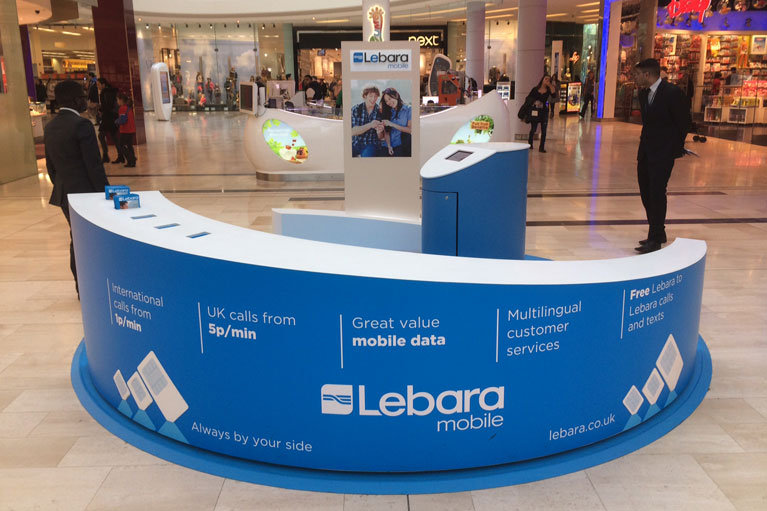With over 8 million foreign-born residents in the UK – the migrant pound has become a potential market for many consumer brands. Leading by example – Lebara Mobile started their services in 2001 establishing itself as a brand for the migrant community. Talking about the potential of the migrant pound, we take you through their inspiring journey.
If you’ve ever been accosted at the airport or station by a SIM card seller clad in bright blue, the chances are you will have come across Lebara Mobile.
The little-understood but highly visible company sells cheap international airtime to tourists and economic migrants arriving in the UK. Its staff stalk Britain’s biggest transport hubs in a bid to beat bigger mobile rivals – O2, EE, Vodafone and Three – to make customers of the thousands of people who arrive in Britain each month to live.
Even Lebara’s boss and co-founder, Yoganathan Ratheesan, is no stranger to an unsolicited sales pitch. “Every one of our employees has to spend a day in the station selling SIM cards,” he said. “I love doing it, because it’s what made our company what it is today.”
Lebara’s bellicose sales tactics are arguably the result of an aggressive price war between Europe’s mobile companies. In a market where margins are tight, its deals are almost identical to those of rivals. The proof is in the £430m sales London-based Lebara stacks up across Europe, where it operates in Germany, Denmark, Holland and Poland as well as the UK.
The firm sells pay-as-you-go and bundled overseas calls by piggybacking on local mobile networks.
Sri Lankan-born Mr Ratheesan was in his mid-twenties when he set up the company in 2001 alongside colleagues, Baskaran Kandiah and Rasiah Ranjith Leon, selling international calling cards. The trio came up with the idea on a work trip. After seeing Norway’s Telenor building on the way to the airport – the country’s equivalent to BT – they realised that Europe’s mobile giants were missing a trick with the migrant market.
The company, which gets its name from the first two letters of each of the founders’ names, finally found investment from the Dutch network, KPN.
“Most people didn’t understand what I was talking about with the ‘migrant market’,” said Mr Ratheesan, now the sole chief executive. “But a guy in the Netherlands from KPN listened to me and said yes – let’s give it a try.”
He said their two-day launch event saw them sell out of 25,000 SIM cards in one morning. The company now has more than 5m customers. An impressive feat for the 40-year-old, who arrived in Britain 20 years ago with his family to escape civil war.
The entrepreneur, now worth an estimated £250m, said he owes his wealth to the millions of migrants who were similarly displaced.
Lebara has won industry awards for its service, and has been voted the best “virtual” operator for seven consecutive years in the annual Mobile News awards. Ofcom’s latest data shows a surge in complaints among Lebara’s bigger mobile rivals. Vodafone saw complaints from its contract customers double in the previous year according to Ofcom, amid an industry-wide increase in customer complaints.
The founder argues that the company’s focus on service should help it weather a challenge from the major mobile networks, which are beginning to wake up to the so-called “migrant pound.”
“Phone calls to their family and friends back home are greatly important and our company takes care of that,” said Mr Ratheesan. “If my dad rings our call centre, we should be able to help him.”
There are 43 languages being spoken at any one time by Lebara’s contact staff, Lebara claims. “Good service in one language is a struggle for most mobile networks,” said Mr Ratheesan.
Workers in Lebara’s head offices – situated in London’s start-up hub, Old Street – are surrounded by quotations from Mr Ratheesan’s favourite figures, from Mother Teresa to Henry Ford.
“They’re in every meeting room, but some are made up – like if you join our finance team, you can’t miss the slogan ‘We pay our people on time’,” said Mr Ratheesan, who ranks as one of the top 25 bosses to work for in the UK, according to Glassdoor.com, which analyses thousands of anonymous employee reviews.
One of the challenges facing Lebara is the industry-wide decline in voice revenues, as demand for data and Wi-Fi increases. “The whole industry is affected by this decline – all the mobile operators are being hit,” he said.
However, at the same time, his potential audience is growing. Net migration to Britain increased 11% last year, according to the latest figures from the Office for National Statistics. The company is expecting an influx of Polish, Romanian and Hungarian customers in the next few weeks in its British and German markets, where short-term workers arrive for agricultural work.
Mr Ratheesan said: “The existing migrant community in Europe is already huge. I can’t take a stand on whether we should allow more or fewer people, but the people who are already here are underserved.”
This article was originally published in The Telegraph

